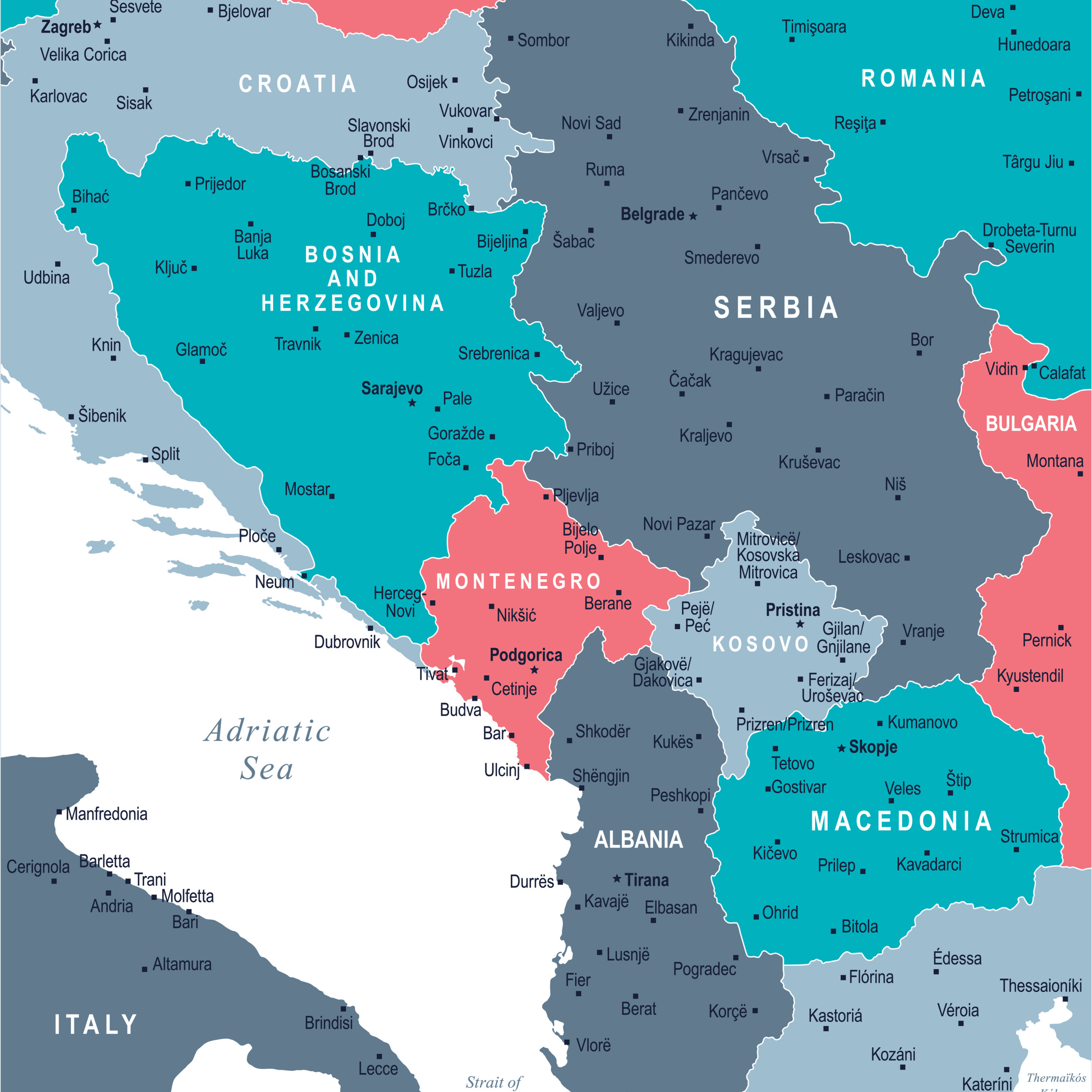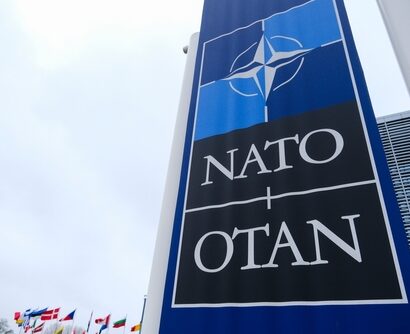Abstract: The Western Balkans region is both politically and economically significant for Europe. This article examines the security issues and further identifies development issues that threaten the stability of this region as it finds itself at a dangerous crossroads between the West and the East. As of 2022, the influence of the Russian Federation and the war in Ukraine have evoked some of the most important security questions not just in Europe but worldwide.
Bottom-line-up-front: The European Union has helped sustain and improve every aspect of this region ever since the end of the Yugoslav wars (1992-2001). However, the constant issues of nationalism and corruption, coupled with geographic and political divides in this region, have stultified its growth for almost three decades. Albeit some progress has been made, the West and Russia are in a constant tug-of-war to command influence over this region. The security issues coming to the fore due to the war in Ukraine are making this situation increasingly time-sensitive with respect to strengthening Russian influence in this region.
Problem statement: How to analyze the current situation in the Western Balkans concerning the ever-growing influence of foreign countries and a split decision-making process amid the war in Ukraine and the rising tensions in some regions of the Western Balkans?
So what?: The war in Ukraine has shattered the region with tangible consequences. Although there is a looming threat of a new conflict and continuous separation, Western Balkan countries still have a chance to pursue a collective, peaceful, and prosperous path. The European Union and NATO should pursue their democratic goals with all six countries of this region to stabilize the region and acquire strong regional partners.

Source: shutterstock.com/Porcupen
Nationalism and Populism
Twenty years have passed since the end of the Yugoslav Wars, and the Western Balkans are still under the strong influence of nationalism and right-wing populism. The Balkan people are preoccupied with the issues of war and continue to vote for the same parties that have remained in power since the beginning of the Yugoslav wars. The security and general functionality of the region is always in question because the people elect the same parties every four years due to scaremongering. The six states of the Western Balkans (i.e., Albania, Bosnia and Herzegovina, North Macedonia, Montenegro, Kosovo, and Serbia) are affected by the same problems as the former states of the Soviet Union. Specifically, after the fall of both the USSR and Yugoslavia, the states and people therein were left scattered, thus causing a mass discontentment that led to war.
The Balkan people are preoccupied with the issues of war and continue to vote for the same parties that have remained in power since the beginning of the Yugoslav wars.
A Path towards the European Integration
Unlike Slovenia, countries like Bosnia and Herzegovina, Croatia, and Kosovo, which was still part of Serbia at the time, experienced wars that shook the whole of Europe. It was the worst conflict on European soil since World War II. Ever since the Yugoslav Wars ended, these countries have been exposed to both Western and Eastern influences. Serbia was, and still is, maintaining close ties with Russia, spreading the fear of a new conflict and trying to destabilize the region’s integration into the European Union (EU). The President of Kosovo, Vjosa Osmani and Albin Kurti, prime minister of Kosovo claim that Serbia together with its president Aleksandar Vucic undermines the stability of this region and simultaneously help Moscow to achieve its political pressure on NATO and EU.[1] The current situation in Ukraine is clear proof and a warning from Russia towards NATO and the EU to cease further eastward expansion and integration of these countries. Therefore, it is necessary to gain momentum with constructive dialogue between the EU, NATO, and Western Balkans.
The EU has been investing in the Western Balkans since the end of the Yugoslav Wars. In 2021, the European Commission agreed on an Enlargement Package including the Western Balkan States and Turkey. This Enlargement Package should help individual states of Western Balkans and Turkey on their path to the European Union with numerous reforms and clear guidance on how to fully integrate to the EU community.[2]
Thereby, Joseph Borrell, the EU High Representative for Foreign Affairs and Security Policy/Vice President of the European Commission, endorsed this package by saying: “With today’s report, we provide a detailed assessment of the progress made in the Western Balkans and Turkey, and where work remains to be done. We have to maintain a credible enlargement process……On the EU side, we need to deliver on our commitments. The EU is not complete without the Western Balkans. It’s time we come together and unite in building a stronger Europe.” -Joseph Borrell (2021)[3]
Later Olivér Várhelyi, Commissioner for Neighborhood and Enlargement further added: “Enlargement policy is a geostrategic investment in peace, stability, security, and economic growth on our European continent….”– Olivér Várhelyi (2021)[4]
On the EU side, we need to deliver on our commitments. The EU is not complete without the Western Balkans. It’s time we come together and unite in building a stronger Europe.
This shows how important the Western Balkans are to the EU. Further, after witnessing the current war in Ukraine, it is possible to imagine a similar situation cropping up in the Balkans. This is why the security and peace of this region, and the adoption of Europeanization is of great importance for the EU. However, the negotiations between these countries and the EU have been progressing gradually, with Kosovo and Bosnia and Herzegovina as potential candidates, Albania and North Macedonia as candidate countries, and Serbia and Montenegro already conducting accession talks.
North Macedonia applied for EU membership in 2004. Despite fulfilling the accession criteria, the Bulgarian government objected to further pursuing EU integration owing to conflicts regarding language and preserving national identity. Albania applied in 2009, but talks on the membership have commenced only recently. The Bulgarian government vetoed this membership as well. Albania and North Macedonia should have launched their membership talks at the end of 2020 but the previous government of Bulgaria vetoed it because of their claim that the Macedonian language is just a Bulgarian language with dialect this path remains closed. A similar situation occurred with Greece when Macedonia had to change its name by referendum from Macedonia to North Macedonia. The Bulgarian government now wants North Macedonia to acknowledge that their language is Bulgarian and not Macedonian. Montenegro applied in 2008, and accession talks have been ongoing since 2012, but issues concerning the health system, organized crime, and widespread corruption complicate matters. As Kosovo is closely linked with Serbia, Kosovo’s membership status will mostly depend on the normalization agreement between the two countries made in 2020. This agreement will help improve the economic ties between the two countries. Kosovo has received a potential candidate status but is still not recognized as an independent state by countries including Cyprus, Greece, Romania, Slovakia, and Spain. Until then, Kosovo has to improve their relationship with Serbia – and vice versa –, in order for both countries to enter the EU.
In contrast, Serbia and Bosnia and Herzegovina carry incredible importance for the EU, and thus, they both stand on different feet since they both hold a different statuses on their path to the EU membership. Serbia submitted its application in 2009, but the accession talks have been ongoing since 2014. Serbia depends on the same agreement as Kosovo, as mentioned above. Other than that, Serbia must improve its independence of the judiciary, meaning to improve the freedom of media, fight against corruption. Nonetheless, Serbia’s close ties to China and Russia are contributing to these mixed emotions and signals to the EU as well. The EU is unsure whether Serbia is willing and determined to “Europeanize” itself. Similarly, Bosnia and Herzegovina has had a potential candidate status since 2003, but the internal problems of this country remain unresolved.[5] Currently, the Western Balkans’ path to EU integration is beset by various domestic and regional conflicts, obfuscating potential developments.
Serbia’s close ties to China and Russia are contributing to these mixed emotions and signals to the EU as well.
The Growing Influence of China and Russia
After a decade of negotiation, the committed efforts of the EU in this region are fading due to the high pressure of superpowers like China and Russia that constantly influence this region. In recent years, the influence of superpowers like China and Russia, is increasing and slowly coming to light. On the one hand, according to some investigators in Bosnia and Herzegovina, Russian mercenaries have been training and helping to establish a paramilitary unit to support the Serb separatists. Additionally, Russia has been opposing NATO membership for this country. On the other hand, China has been loaning money to support infrastructure programs across the Western Balkans (e.g., the loan of US$1 billion to Montenegro for road construction or other projects like BRI [Belt and Road Initiative] through Serbia).[6]
In recent years, the influence of superpowers like China and Russia, is increasing and slowly coming to light.
Moreover, China was ´blessed ‘ by the Western Balkan States through their engagement during the COVID-19 pandemic, wherein China supplied Serbia with much equipment to fight the crisis in addition to COVID-19 vaccines. Nonetheless, all Western Balkan States are part of the 16+1 BRI from China. Moscow has maintained close relations with Orthodox Balkan Slavs and is the region’s main gas and oil provider.[7] Since the start of the war in Ukraine, Russia declared that it would offer a reasonable gas and oil price to their so-called friendly countries, and Serbia is one of them. Recently, the Russian Federation has cultivated a close relationship with the Serb member of the tripartite presidency in Bosnia and Herzegovina, Milorad Dodik, who is constantly calling for the independence of the Republic of Srpska from Bosnia and Herzegovina and promoting Russia’s opposition to the Bosnian state in general. Furthermore, Russia has provided local support in Bosnia and Herzegovina and Serbia to turn them against NATO.[8]
The Russian Federation has cultivated a close relationship with the Serb member of the tripartite presidency in Bosnia and Herzegovina, Milorad Dodik, who is constantly calling for the independence of the Republic of Srpska from Bosnia and Herzegovina and promoting Russia’s opposition to the Bosnian state in general.
Russia’s strategic plan is to be a main country involved in the security of this region alongside Germany, France and the UK. Russia´s strategy is to use the vulnerability of this region against the NATO and the EU since most of these countries are determined to join the West. Russia is considering the Kosovo crisis in 1999 as a humiliation from the United States and that is also one of the reasons why Russia is trying to get back to this region. The war in Ukraine can also be considered not just as a direct threat to NATO but a revenge for this humiliation. Serbia has aligned itself with Russia to maximize its leverage over Kosovo. This strategy that Russia is imposing has similarities to what the West is doing in countries like Ukraine, Moldova, Georgia or any other country close to Russia’s border. The problem is that Russia and the West hold different views and principles on how society should look like. Russia is also supporting the anti-government movements in pro-EU and NATO countries like North Macedonia and Montenegro.[9] China, as mentioned above, started their 17+1 initiative but the EU still holds the position of the biggest investor in this region. China’s investment consists mostly of loans and on the example of Montenegro, we can see that Montenegro holds 22% of its foreign debt to China through this investment. During the 1999 bombing of Yugoslavia and the tragic death of three Chinese officials, China developed a strong relationship with Serbia as they both opposed the West. China is one of the countries that, together with Russia, does not recognize the independence of Kosovo, and we can say in the return that Serbia doesn’t recognize Taiwan as well. After the pandemic in 2020, China offered to help Serbia during the pandemic, and the president of Serbia kissed the Chinese flag on his trip to Beijing. This picture was published all over the media in Serbia. Shortly afterwards, the EU announced an $18 million medical support package and therefore, Serbia tried to balance its interests with China and EU. Contrary to Russia, China does not oppose the EU-membership of these six countries as the EU´s prospect offers stability for Chinas investments. The EU has a multilateral approach promoting transparency, fiscal rentability, the rule of law, environmental protection and anti-corruption. This is a total opposite of China, as they have a no-conditionality approach and therefore, is this a very attractive alternative.[10]
NATO: A ´Safe Haven´?
The path of NATO accession has been safe and secure for some states like Albania, North Macedonia, and Montenegro; these countries became NATO allies after the Yugoslav Wars. However, for other Balkan countries, like Bosnia and Herzegovina, NATO membership remains a goal yet to be accomplished.
After the NATO bombing of Yugoslavia in 1999, Serbia turned against this alliance and rejected any possibility of joining.[11] Bosnia and Herzegovina, together with Serbia, joined the Partnership for Peace Programme in 2006. This programme for practical bilateral cooperation with NATO could eventually help Bosnia and Herzegovina to achieve full NATO membership.[12] Although Serbia joined this programme, their general population and their government are still against the full membership because of the bombing in 1999. Currently, Bosnia and Herzegovina is participating in MAP (Membership Action Plan), and NATO is ready to accept Bosnia´s first Annual National Programme under MAP.[13] However, this is not an easy task for Bosnia because the representatives of the Republic of Srpska (entity in Bosnia and Herzegovina) are declaring their neutrality with respect to NATO. On March 23, 2022, at an extraordinary NATO summit regarding the crisis in Ukraine, Bosnia and Georgia were mentioned by NATO Secretary General Jens Stoltenberg. Stoltenberg highlighted the importance of NATO presence and urged to strengthen the relationship with Bosnia and Herzegovina and Georgia amid Russia’s growing influence in the region.[14]
Bosnia and Herzegovina is participating in MAP, and NATO is ready to accept Bosnia´s first Annual National Programme under MAP.
Why Ukraine?
Although the dissolution of the Soviet Union and Yugoslavia bear some similarities, they are two separate issues. Since the current war in Ukraine began, people in the Western Balkans started to fear a possible outbreak of another conflict mirroring the ones that occurred during the Yugoslav Wars. This is a credible threat as both Bosnia and Ukraine are mired in intra-state and inter-state conflicts. Bosniaks see themselves as the victims of both Croat and Serb aggression, which is why they identify with the Ukrainian people, defending themselves from both Russian aggression and pro-Russian Ukrainian insurgents. A plausible comparison can be made between the current self-proclaimed Donetsk and Luhansk People’s Republics and the Republic of Srpska in the 90s. As a knock-on effect of the war in Ukraine, the Western Balkans region is becoming increasingly unstable. NATO should work on improving its image in Serbia, and North Macedonia and Albania should start their accession talks with the EU. While Russia’s misinformation tactics have managed to influence the Balkan people to some extent, it remains unclear whether Western or Eastern influence is stronger in the region.[15]
A plausible comparison can be made between the current self-proclaimed Donetsk and Luhansk People’s Republics and the Republic of Srpska in the 90s. As a knock-on effect of the war in Ukraine, the Western Balkans region is becoming increasingly unstable.
Countries like Albania, Bosnia and Herzegovina, Kosovo, North Macedonia, and Serbia are more vital than ever for the EU and NATO. Since the war in Ukraine started, the world has started to recognize the significance of the Western Balkans as Russian influence spreads across the region. The destiny of the Western Balkans remains undecided, but there is strong hope that the war in Ukraine will act as a wake-up call for the EU and NATO to start reconsidering their approach toward the Western Balkans.
Armin Dusinovic is a BA Political Science student at the University of Vienna. His fields of research focus on international relations and security studies. He was a member of different national and international NGOs. The views contained in this article are the author’s alone.
[1] “Russia May Pressure Serbia to Undermine Western Balkans, Leaders Warn,” The Guardian, Guardian News and Media, March 11, 2022, https://www.theguardian.com/world/2022/mar/11/russia-may-pressure-serbia-to-undermine-western-balkans-leaders-warn.
[2] “2021 Enlargement Package: European Commission Assesses and Sets out Reform Priorities for the Western Balkans and Turkey,” European Neighbourhood Policy and Enlargement Negotiations, October 19, 2021, https://ec.europa.eu/neighbourhood-enlargement/news/2021-enlargement-package-european-commission-assesses-and-sets-out-reform-priorities-western_en.
[3] Idem.
[4] Idem. [5] “Where Do Western Balkan Nations Stand with Their EU Membership Bids?,” Euronews, October 6, 2021, https://www.euronews.com/my-europe/2021/10/05/eu-facing-crisis-of-credibility-in-western-balkans-as-leaders-meet-for-regional-summit.
[6] Merisha Gadzo, “As EU Hopes Fade, Russia, China Fill Voids across Western Balkans,” European Union News | Al Jazeera. Al Jazeera, October 11, 2021, https://www.aljazeera.com/news/2021/10/11/with-no-eu-strategy-russia-china-fill-void-in-western-balkans.
[7] “Power Games in the Balkans,” GIS Reports, March 22, 2022, https://www.gisreportsonline.com/r/power-balkan/.
[8] Henrik Boesen Lindbo, “The Western Balkans between the EU, NATO, Russia and China,“ Center for Security Studies (CSS / 2020), ETH Zürich: 3 DOI: https://doi.org/10.3929/ethz-b-000412853. [9] “Russia’s Strategic Interests and Tools of Influence in the Western Balkans,” Atlantic Council, December 20, 2019, https://www.atlanticcouncil.org/blogs/new-atlanticist/russia-strategic-interests-and-tools-of-influence-in-the-western-balkans/.
[10] Stephanie Fenkart, “China’s Influence in the Western Balkans: Partnership or Confrontation?,” IIP, February 1, 2022, https://www.iipvienna.com/new-blog/2021/9/21/chinas-influence-in-the-western-balkans-partnership-or-confrontation.
[11] W. J. Fenrick, “Targeting and Proportionality during the NATO Bombing Campaign against Yugoslavia,” European Journal of International Law 12, no. 3 (2001): 489–502. https://doi.org/10.1093/ejil/12.3.489.
[12] Hamza Preljevic, “UNsatisfied? The Rocky Path to NATO Membership – Bosnia and Herzegovina: A New Approach in Understanding the Challenges,” Croatian International Relations Review (2017): 43-45 DOI: 10.1515/cirr-2017-0020.
[13] NATO, “Membership Action Plan (MAP),” NATO, March 30, 2020, https://www.nato.int/cps/en/natolive/topics_37356.htm.
[14] NATO, “Press Conference by NATO Secretary General Jens Stoltenberg Previewing The Extraordinary Summit of NATO Heads of State and Government,” NATO. Accessed March 31, 2022, https://www.nato.int/cps/en/natohq/opinions_193610.htm.
[15] Othon Anastaskis, ACM Briefs January 2021: “The Russo-Ukranian Crisis and the Western Balkans: Asscoiations and Knock-on Effects”, Atlantic Council of Montenegro. https://ascg.me/wp-content/uploads/2022/02/ACM-Brief_January-2022-final.pdf.






